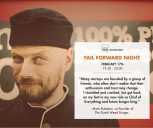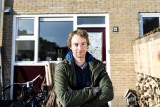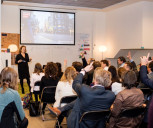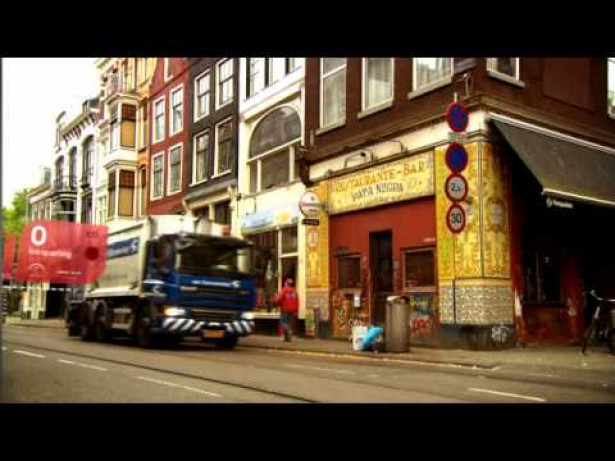Stay in the know on all smart updates of your favorite topics.
Register now for Global Festival of Ideas for Sustainable Development (Bonn 1-3 March)
Be part of the official launch of the UN SDG Action Campaign at the Global Festival of Ideas for Sustainable Development, taking place in Bonn from 1 – 3 March 2017
The conference will take place in English. In addition, the city of Bonn and its annual partner Engagement Global, carry out six sessions for the German speaking audience (media, communicator, city representatives on the working level) in German. In order to register for the entire festival please follow the link in the invitation or go to the website http://globalfestivalofideas.org/. Despite the mentioned deadline on the homepage, registration is open until 12.02.2017.
Swipe your ideal city with this Tinder-like participation app
The City of Santa Monica wants its residents to think about the urban development and launches the app Cityswipe. People can find pictures of possible new buildings or art pieces for the city and click the ones they like most. A great inspiration for city makers! This article is in Dutch, the app in English.
Local Collaboration - Acceleration renewable energy

Festivals powered by renewable energy? Solar-Energy on shared roofs? Schools that share their generated energy locally in their community? There are numerous possibilities to accelerate the energy transition in the Netherlands. Many initiatives are born from local ambition, and that is not a coincidence! Local collaboration is the key to successful realization. Establishing a renewable ambition with all involved stakeholders, making the right technical, legal, financial and organizational choices and ensuring mutual benefit, that’s what signifies LOcal COLlaboration.
Festivals powered by renewable energy? Solar-Energy on shared roofs? Schools that share their generated energy locally in their community? There are numerous possibilities to accelerate the energy transition in the Netherlands. Many initiatives are born from local ambition, and that is not a coincidence! Local collaboration is the key to successful realization. Establishing a renewable ambition with all involved stakeholders, making the right technical, legal, financial and organizational choices and ensuring mutual benefit, that’s what signifies LOcal COLlaboration.
Together, today
Renewable energy from your own community or municipality is within reach today by teaming up parties that need each other! This is possible by creating marketplaces to connect local energy-cooperatives with companies or institutions with a large roof. There are multiple initiatives throughout the Netherlands facilitating this. This way cooperatives will realise solar projects, companies or institutions will generate profit by leasing out their roofs, and communities gain access to local renewable energy.
In local collaboration
Lasting collaboration with stakeholders on a structural basis increases the chance of success. This way it is proven that involving residents/renters is essential to achieve sustainability in housing corporations. Currently, several collaborations of housing corporations (Duurzaamheidskringen) are working together with their residents to realise the installation of solar panels on their housing stock, to increase sustainability as well as comfort of living.
Mutually beneficial
In order to fulfil an ambition and to sustain an ‘all hands on deck’ mentality during the exploitation of sustainable services, a mutual benefit is of major importance. In the case of the energy transition for festivals and public events, ensuring a near-constant energy cost for festival organizers as well as operational reliability for the owner is essential in order to be successful and to contribute to the sustainability goals of the municipality.
Working together with all stakeholders, sharing knowledge and proven practices and creating local value accelerate the renewable energy transition.
Locol connects and guides parties in the journey to reach collective local sustainable energy goals, benefiting all involved. Locol is committed to local and regional governments, housing corporations, residents, energy cooperatives and owners/operators of (event) sites and large buildings. In 2014 Locol has been initiated as a social business with a cost neutral business model by the Netherlands’ largest energy network company Alliander.
Startupbootcamp Smart City & Living Program Applications

In the past few months, we have talked to a lot of interesting startups in the Smart City & Living industry applying for our Startupbootcamp accelerator program. Applications are still open until this Friday, February 10. Have you, or someone you know been thinking about applying? There is still time. More information here: http://bit.ly/2g2CiQL
Successful Entrepreneurs Share Their Secrets at our 1st Fail Forward Night

Let’s be honest, failing is part of every entrepreneur’s career. We’re just not always comfortable talking about it. Join us on 17 Feb for the very first edition of Fail Forward Night and learn from other people's mistakes in preparation for your own fail forward moments on the road to success.
At Impact Hub Amsterdam we believe that experimentation is essential for innovation. As part of the 2017 edition of the Investment Ready NL Program, in which 11 circular enterprises embarked on a peer-to-peer learning journey, we invited three seasoned entrepreneurs to share their experiences with failure and difficult moments: Claudia Valladares (Impact Hub Caracas), Bert van Son (MUD Jeans) and Mark Kulsdom (The Dutch Weed Burger). There will be plenty of time for Q&A.
Sign up via http://bit.ly/IRPFailForward
28 februari - MaaS Meetup #2: "Samenwerking in de keten"
Are you joining us? (Article in Dutch)
Renewable Transformation Challenge (1st Prize 20k | apply before April 30)
Elsevier and the International Solar Energy Society (ISES), are proud to announce the launch of the Renewable Transformation Challenge. The award has been launched to encourage the progress to a world powered by renewable energy and accessible energy for all.
Applications may present ongoing projects, product ideas, innovative technologies, policy initiatives, programs, research, analyses, or complete solutions targeting either supply side (energy generation for end-use energy consumption) or demand side (energy efficiency) programs, or both.
The winning proposal will be the one that best demonstrates the transformation to a world powered by renewable energy and that has potential to widen access to energy, particularly in developing countries. Submissions will be assessed in terms of applicability, impact, sustainability and scalability. Innovative ideas will be given preference over incremental improvement projects.
How to apply
The Challenge opens for submissions on February 6, 2017 and the deadline for submitting proposals is April 30, 2017. Applications are open to individuals and organizations in both not-for-profit and commercial sectors worldwide.
Visit the Renewable Transformation Challenge landing page for more information on judging criteria and application guidelines.
Amsterdam following soon to be car free ?
With the Amsterdam Smart Mobility vision presented last year this goal is set on the agenda as well
Maker spaces for kids in public library opens today!
Great initiative by our partners Waag Society, University of Applied Sciences and city of Amsterdam!
The Earth Circle: making environmentalism pay its way
'Making waste a thing of the past, new ideas on the environment are reusing or regenerating raw materials so that they pay dividends for business as well as the planet.' Beautiful short docu by The Economist with great footage of Metabolic, the Ceuvel and Buiksloterham.
Going off the grid in Amsterdam. What on earth was Koos Marinus (34) thinking?

Koos (teacher, 34 y/o), Frank (designer, 46 y/o) and other ‘ordinary’ people in Amsterdam have decided to go for it. Who are these ‘Amsterdammers’ who have turned their homes into small sustainable energy plants? And why on earth did they do it? A portrait of three people who went all the way and say they live more comfortable than ever.
Part 1: Koos Marinus from Amsterdam Nieuw-West (article in Dutch)
Living in the middle of Amsterdam and producing nearly all your own electricity and heat: Koos (teacher, 34 y/o), Frank (designer, 46 y/o) and Jan Pel (student, 25 y/o) have decided to go for it. Who are these ‘Amsterdammers’ who have turned their homes into small sustainable energy plants? And why on earth did they do it? A portrait of three people who went all the way and say they live more comfortable than ever.
This is a tripartite series on living off the grid in Amsterdam. Read part 2 with Frank Hylkema here and part 3 with Jan Pel here**. (in Dutch)
Part 1: Koos Marinus from Amsterdam Nieuw-West (article in Dutch)**
Net als zijn vader, houdt Koos Marinus(34) enorm van fikkies stoken. En buiten zijn. Als kind kon hij eindeloos spelen op het braakliggende terrein achter hun huis in Drachten. Ook heeft hij goede herinneringen aan de natuurvakanties die ze toen hadden: kamperen in de Ardennen of logeren in een blokhut in Noorwegen. Toch woont dit Friese buitenkind tegenwoordig in Amsterdam Nieuw-West met vriendin Suzanne (36), afkomstig uit Groningen, en dochter Rozemarijn (4). “Ik droom nog steeds van een boerderijtje in the middle of nowhere maar Suzanne wil dat absoluut niet.”
Een leuke nieuwe kleuterjuf
Onafhankelijk van elkaar verhuisden Koos en Suzanne, beiden opgeleid als basisschool leerkracht, zo’n 6 jaar geleden van het Noorden naar het Westen van het land omdat er in Amsterdam meer werk was. Ze ontmoetten elkaar op school: “Er stapte tijdens de Kerstborrel ineens een leuke nieuwe kleuterjuf binnen. Ik woonde zelf pas 2 maanden in Amsterdam, kon het Vondelpark nog niet eens vinden, maar beloofde haar de stad te laten zien. Van het één kwam het ander. 5 maanden later was ze zwanger van Rozemarijn.”
Suzanne was in het begin doodongelukkig in Amsterdam. Hun afspraak was om, als Rozemarijn 4 werd, terug te verhuizen naar het Noorden. Het liep anders. Suzanne maakte veel nieuwe vrienden en wilde toch blijven. Ze besloten een huis te kopen. “We huurden al een tijd een huis in Osdorp voor €950 per maand. Dat vonden we zo enorm hoog. Toen zijn we eens gaan onderzoeken hoeveel het zou zijn als we zouden kopen.” In juli 2016 kochten ze een eengezinswoning van 100 m2 in Slotermeer, vlak naast het Sloterpark. “Nu betalen we, inclusief een fikse verbouwing, €750 per maand, waarvan we €450 per maand aflossen.”
Een soort jongensdroom
Het huis was totaal uitgewoond en moest helemaal verbouwd worden. Eén ding was vanaf het begin duidelijk. Er moest een houtkachel in komen, een lang gekoesterde wens van Koos. “Mijn hele jeugd hadden we thuis een houtkachel. Zo lekker die warmte daarvan. Veel minder droog dan van een centrale verwarming. Tenminste zo ervaar ik het. En wat is er nou eigenlijk mooier dan elke dag een fikkie te mogen stoken?” Verder was het plan het huis zo energiezuinig mogelijk, het liefst energieneutraal, te maken. Die beslissing had Koos al genomen ver voordat hij Suzanne ontmoette. “Toen ik jong was, hoorde ik over zure regen. Toen besefte ik voor het eerst dat mensen dingen doen die de natuur, waar ik zo dol op was, kapot maakte. Daar maakte ik me zorgen over. Ik werd lid van het Wereld Natuurfonds en Greenpeace enzo. Later besloot ik, als ik ooit een eigen huis krijg, moet het energieneutraal worden. Eigenlijk een soort jongensdroom.”

Avondenlang googelen
Koos had nauwelijks kennis over energie of installaties maar wel een grote nieuwsgierigheid naar wat er allemaal was en hoe het werkt. Avondenlang zat hij te googelen op ‘energiebesparende maatregelen’ en maakte een plan. Dat was ook wel nodig want zijn Turkse aannemer Ibrahim was minder gecharmeerd van het idee van energieneutraal verbouwen. “Een prima kerel maar ontzettend eigenwijs. Hij vond het allemaal maar onzin. Vaak deed hij of hij me niet verstaan had en ging hij gewoon zijn eigen gang. Ik moest er bovenop zitten. Vooral bij de isolatie moest ik elke dag controleren” Koos was daardoor op zichzelf aangewezen “Het is maar goed dat wij als leraren zoveel vakantie hebben, daardoor had ik veel tijd om alles uit te zoeken.”
Murphy’s law
“Tijdens de verbouwing ging alles mis wat mis kon gaan. Het was echt Murphy’s law.” Zo was er een lekkende zonneboiler, een trillende warmtepomp en een piepende omvormer. “Voor de aanleg van de UTP kabel zijn geloof ik wel 4 verschillende monteurs langs geweest.” Koos had leverancier ‘Zon in huis’ ingehuurd om te zorgen dat alle installaties zoals zonnepanelen, zonneboiler en warmtewisselaar goed op elkaar afgestemd zouden worden. Bovendien leek het hem handig één aanspreekpunt te hebben in de plaats van allerlei verschillende monteurs en bedrijven. “In praktijk viel dat ontzettend tegen. ‘Zon in huis’ had bijvoorbeeld op basis van hun satelliet foto gezegd dat er 8 panelen op ons dak pasten maar de monteur die langskwam zei dat er makkelijk 10 op konden. Toen ze kwamen installeren, bleken er toch maar 8 op te kunnen. Hiervoor was een andere omvormer nodig maar die hadden ze niet bij zich. Bovendien moest er eerst goedkeuring van ‘Zon in huis’ komen om minder panelen te leggen dan afgesproken. Die waren die dag onbereikbaar. De monteurs hebben de halve dag op mijn stoep zitten wachten.”
Ondanks alle tegenslagen heeft Koos geen moment overwogen het bijltje er bij neer te gooien. “Je doet het maar één keer dus je moet gewoon even doorzetten.” Ook is hij nog steeds onverminderd enthousiast over wat er allemaal mogelijk is: “Zo’n douche warmtewisselaar vind ik gewoon geweldig. Zo’n wonderlijke techniek. Je doucht, het warme water loopt langs het koude water en wordt zo voorverwarmd. Bijna elke keer als ik gedoucht hebt, loop ik half afgedroogd naar boven. Dan zie je dat je het water weer 4 graden bij verwarmd hebt. Je zou er bijna langer door gaan douchen ”
Van het gas af
Helemaal energieneutraal is het huis van Koos en Suzanne nog niet want ze maken nog gebruik van gas. “Mijn vader had mijn moeder die houtkachel min of meer opgedrongen en ze vond het verschrikkelijk. Ze kreeg hem soms niet aan en zat dan met twee kleine kinderen in een ongeïsoleerd koud huis. Dat wilde ik Suzanne en Rozemarijn niet aan doen. Je moet gewoon de thermostaat op 20 graden kunnen zetten en dat het dan meteen warm wordt” Toch verwacht Koos in minder dan twee jaar ook zonder gasaansluiting te kunnen. De leiding voor de inductiekookplaat ligt er al. “We kijken het nog even aan maar we merken nu al dat het zonder eigenlijk ook wel prima gaat. Suzanne heeft het snel koud. Vroeger had ze veel moeite om uit bed te komen want wij verwarmden de slaapkamers nooit. Nu stapt ze zó uit bed want de temperatuur in huis zakt ’s nachts maar een paar graden als de kachel uit is. De warmte blijft veel beter hangen omdat het zo geïsoleerd is”
Tips van Koos:
• Maak goed gebruik van alle bestaande subsidies. Dat maakt energieneutraal verbouwen ook financieel aantrekkelijk. Kijk op Energiesubsidiewijzer. Daar vind je onder andere de City-zen subsidie waar Koos ook gebruik van maakte.
• Lees je goed in van tevoren. Op de site van Milieu centraal staat echt alles zoals stappenplannen maar ook over hoe je de BTW op je zonnepanelen kan terugvragen.
Foto's: To Huidekoper
Tekst: Colette van der Minne
Recap of New Year's Drinks

On January 20 we held the New Year's Drinks including the kick-off of Smart Data Smart City in collaboration with Datalab. Interesting contributions came from keynote speaker Jeroen Slot and pitches of Amsterdam Kunst en Cultuur & Amsterdam Marketing, iCapital Award, PostNL, TransformCity and Hemelswater. The audience also made wishes for Amsterdam as a smart city, what would they love to see happening this year?
On January 20 we held the New Year's Drinks including the kick-off of Smart Data Smart City in collaboration with Datalab. Interesting contributions came from keynote speaker Jeroen Slot and pitches of Amsterdam Kunst en Cultuur & Amsterdam Marketing, iCapital Award, PostNL, TransformCity and Hemelswater. The audience also made wishes for Amsterdam as a smart city, what would they love to see happening this year? Check out the photo report on Facebook.
Video: Convince Media

Dutch cities urge Government to support joint Smart City strategy

A large number of Dutch cities, companies and scientists have contributed to the National Smart City Strategy. Earlier today, they presented their Strategy to Prime Minister Mark Rutte, who had requested a consolidated Smart City Vision. The G5 of the Netherlands' largest five cities (Amsterdam, Rotterdam, The Hague, Utrecht and Eindhoven) together with the G32 of middle to large size Dutch towns are keen to take a leading role and have asked central government in The Hague for support.
A large number of Dutch cities, companies and scientists have contributed to the National Smart City Strategy. Earlier today, they presented their Strategy to Prime Minister Mark Rutte, who had requested a consolidated Smart City Vision. The G5 of the Netherlands' largest five cities (Amsterdam, Rotterdam, The Hague, Utrecht and Eindhoven) together with the G32 of middle to large size Dutch towns are keen to take a leading role and have asked central government in The Hague for support. Please click here for the report.

The aim of the National Smart City Strategy is to improve the quality of life in Dutch cities and to introduce innovative solutions to increase their international competitive strength. As Dutch towns and cities are expanding and the pressure on public amenities and infrastructure is growing, it is vital to undertake action now. Around the world, cities are faced with issues such as urbanisation, climate change, employment, digitisation and mobility. The Dutch towns and cities agree that investments in smart technology are necessary to respond to these major social challenges and will provide a substantial contribution to their economic vitality.
The contributors to the National Smart City Strategy perceive a great need for high-end digital infrastructure and room to experiment, to allow them to develop their pilot programmes into large-scale projects across a range of different areas, including mobility and accessibility of cities, sustainable and low-energy homes and building, improvements of air quality and smart, healthy urbanisation. These initiatives will require the set-up of cross-sector partnerships and active participation from both residents and businesses, focusing on cybersecurity, privacy, interoperability, hyperconnectivity, open source digital infrastructure, standardisation and finance.
The Hague's Deputy Mayor Ingrid van Engelshoven, Portfolio Holder for Knowledge Economy, International Relations, Education and Youth said: 'The joint Smart City Strategy is a key requirement to be able to move ahead. The cities will build on their own strength and the need to draw up joint investment agendas. Cities and towns, businesses, research institutes and Central Government will have to work together to contribute to the economic growth, prosperity and quality of life of our cities, benefiting residents, visitors and businesses alike.'
NXP's Maurice Geraets: 'The National Smart City Strategy offers real solutions to real problems, which can be applied not only in the Netherlands but worldwide. Dennis Mica, 2getthere: 'Together cities are stronger. The Smart City Strategy offers an effective platform to organise partnerships and address the challenges of our times.'
Cities facilitate innovation
The associated cities facilitate experiments to develop innovations and urban applications in living labs, providing solutions which can be replicated by other cities. Working on a larger scale will also provide better business cases and a more attractive investment climate. It is important that projects are guided by the specific qualities of each city and that the cities are prepared to work with other cities as well as with governments, businesses and knowledge institutes.
International positioning
The associated cities aim to step up their international collaborations as well, encouraged by the Smart City World Expo in Barcelona in November 2016 and supported by the Global Smart City & Community Coalition. These global initiatives work in line with the United Nations' Sustainable Development Goals, which also reflect the main principles of the national strategy.
Joint Cities and Central Government investment strategy
It is important for Central Government to recognise Smart Cities as an economic cornerstone with a global impact. Central Government will need to make an active contribution to draw up a joint investment agenda. The associated cities would also like to call on the Dutch Government to facilitate quick decision-making and legal room for experiments.
Smart Cities requires co-ordination
Together, the public and private parties as well as the academic institutes propose that the different ministerial departments co-ordinate their actions to support the cities' Smart City development. It is essential that they share knowledge, co-ordinate national initiatives and contribute to the alignment of the various requirements. In effect, city councils, businesses and knowledge institutes are already linked up through regional platforms, but a well co-ordinated and focused national effort can help to share knowledge, obtain best practices in Smart City solutions, promote smoother collaboration and provide welcome support for the organisation's international activities. This includes providing support for cities, businesses and knowledge institutes to receive national and European subsidies.
------------------------------------------------------------------------------------------------------------------------------------------------------
Note to the editor(s):
The National Smart City Strategy will be presented to Prime Minister Mark Rutte by Ingrid van Engelshoven (The Hague Deputy Mayor), Jack Mikkers (Mayor of Veldhoven, board member of Brainport Eindhoven), Peter Molengraaf (Alliander), Bram Reinders (GSC3) and Maurice Geraets (NXP).
The G5's responsible portfolio holders are:
The Hague: Ingrid van Engelshoven (D66 - Knowledge Economy, International Relations, Education, Youth); Amsterdam: Kajsa Ollongren (D66 – Economy); Utrecht: Jeroen Kreijkamp (D66 - International Relations, Economy, Education); Rotterdam: Maarten Struijvenberg (Economy and Employment), representing Rotterdam was Pex Langenberg (D66 - Mobility, Sustainability and Culture); Eindhoven: Staf Depla (PvdA - Economy, Brainport, Vocational and Professional Education).
Representing the G32 City Network were: Menno Tigelaar (CU Amersfoort - ICT) and Erik de Ridder (CDA Tilburg, - Economy and International Acquisitions, G32 Smart Cities).
For more information, please email press@awarenessengineers.com or contact Deputy Mayor Ingrid van Engelshoven's spokesperson Louis Hueber on +31 6 55740059.
8.1% of Dutch Jobs are Currently Circular
The joint research by Erasmus University and Circle Economy shows that 8.1% of all jobs in the Netherlands are currently circular. This total number comprises all kinds of jobs in different sectors, from waste management to creative industries.
Through this research we now know that 90% of all jobs in the Netherlands are not circular and do not contribute to the circular economy. The Netherlands has huge potential when it comes to the circular economy, but we will have to put in extra effort in order to increase the size and impact of the circular workforce across sectors. Further research by Circle Economy and Erasmus University will bring to light which skills are needed to be able to implement the circular economy and allow the Dutch and local governments to accelerate the transition. Read more: http://www.circle-economy.com/circular-jobs
Stay up to date
Get notified about new updates, opportunities or events that match your interests.

